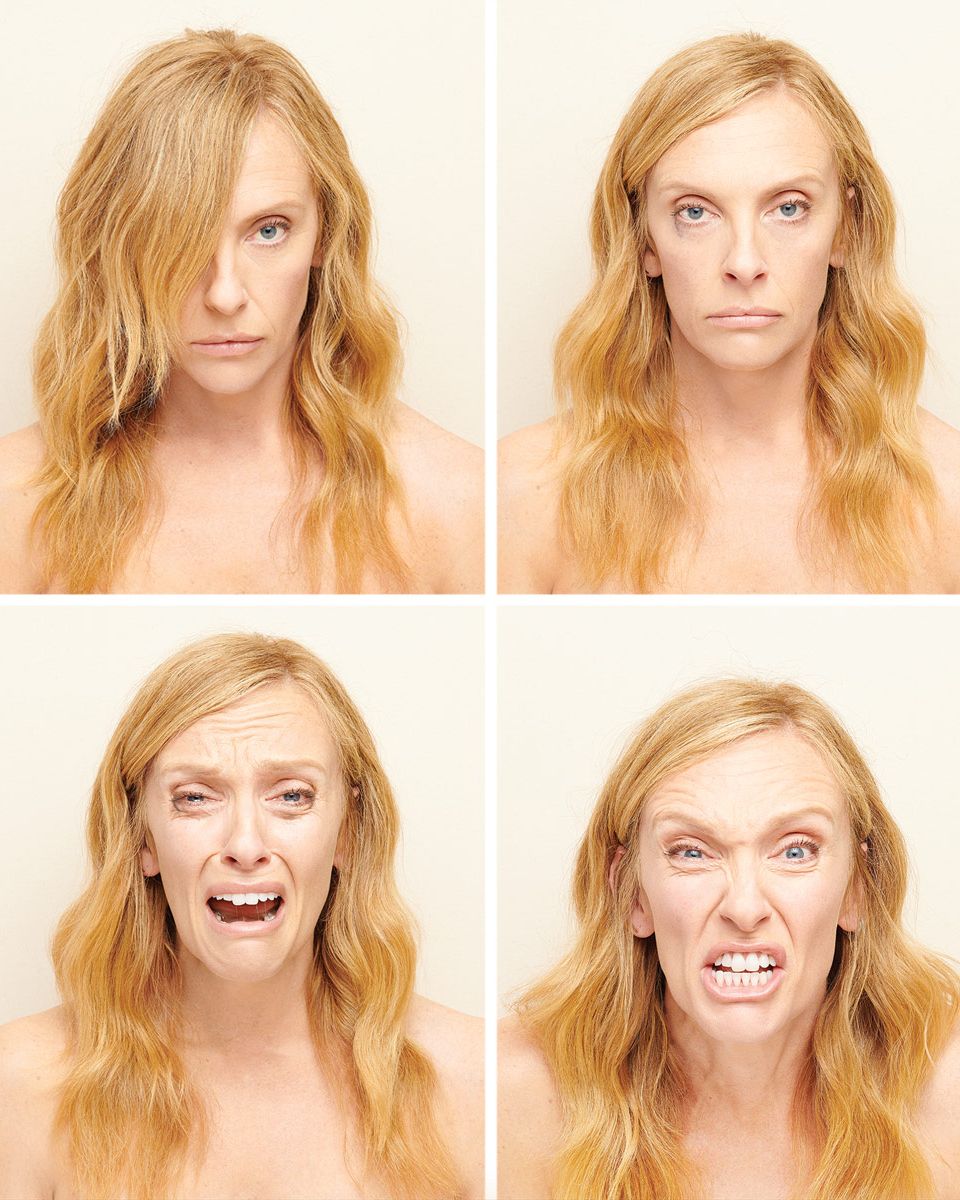Some spoilers below for Hereditary.
In the upcoming horror film Hereditary, written and directed by first-timer Ari Aster, Toni Collette conveys the entire spectrum of human emotion over the course of two terrifying hours. As Annie Graham — a woman who’s just lost her mother and begins to suspect she doesn’t know the entire truth about her complicated family — she’s at once a grieving daughter, a loving wife, a furious and protective mother, an impressionable follower, a confident artist, and a paranoid insomniac (and that’s just the first hour). “When this was sent to me, I had already said to my agent, ‘I don’t want to do anything heavy,’” Collette says. “’Don’t even think about sending me anything heavy.’ He called me, sheepishly: ‘I think you should be in this.’ He was right. I fucking love it, and I hate him for sending it.”
The film begins simply enough, with Annie coming to terms with her recent loss, but quickly escalates into utter insanity — and Collette sells the hell out of every single moment, no matter how outlandish or occult-related. We asked her to reenact Hereditary’s most intense scenes for our camera, then tell us how she managed to make this off-the-walls horror film feel grounded and authentic.
Toni Collette: I’m just gonna take my shoes off. Oh, that feels good.
Vulture: I’m happy for you.
Thank you.
I loved Hereditary — I was so scared and also very moved. That’s rare for a horror film.
That’s what I like about it. It’s a very honest, natural portrayal about a family experiencing a lot of pain, and how it changes them. When I first read it, it kind of felt like The Ice Storm. There’s so much under the surface. I love the unspoken world.
You said in a recent interview that this was the hardest job of your life. Why?
It was just endlessly emotional — and there were lots of emotions. There were ones that are more “acceptable” than others. And ones that feel better to experience than others. This involves none of those! It’s one of the jobs where you get to go to work and roll around in ideas of grief and resentment and rage and all of these extremes in life, and we were dabbling in that area for weeks on end. There was no easy moment in this movie. In my very first week, I was shooting 14-take scenes, talking about great loss and difficulty in relating to my family.
Don’t get me wrong, I fucking loved it. Because it was just so satisfying as an actor to be able to deal with these extremes. It was never done gratuitously. It was always in this pure, honest, natural form. It’s just such a funny combination of themes.
You’ve also said the process surprised you every day. Can you give me a few examples of things that surprised you?
I had a long couple of conversations with Ari – he’d written a lot of backstory to be able to look at and think about. We had a few hours with the kids [Alex Wolff and Milly Shapiro] to just talk through things, and then had dinner with Ari right before shooting, and then we got started.
[We] had a lovefest. I love when that happens at work, when you have an idea about a scene and it always ends up being more. Every single day, it was always more. It was more demanding, it was more honest, it was more intense, it was more satisfying.
Is there a particular scene that you’re thinking of where it was more? How was it more, specifically?
Oh, Jesus. The very first scene I shot is a scene where Ann Dowd’s character takes me back to her apartment and I’m telling her about finding my decapitated child in the back seat of my car. And you can’t even imagine what the reality of that situation is like. You can think about a scene all you want, but then you sit there, and you look at someone as open and as lovely and as present as Ann Dowd, and suddenly, the scene takes on its own energy. And that’s what I mean by more: When people are connecting in a way that you can’t even imagine or construct, it just naturally becomes something bigger than you can even hope for. It’s so exciting because it’s a feeling of being out of control, and you have to give over to the mystery of how things come to be on a film.
Did you find yourself getting lost in this character? Was it easy for you to snap out of it at the end of the day, or were you taking these dark feelings home with you?
It was easy to snap out of it because I was pushing it away. I did not want anything to do with it. At the end of the day, I was happy to go and wash the day off. It was a very focused, intense shoot, but I’ll always be grateful to the hair and makeup team, because they were such a funny group of individuals. They made me laugh every single day. There needs to be a little bit of levity to balance out the experience. It was good to be able to walk out of the dark studio and literally into the light and have a laugh with these lovely people.
To me, the eulogy scene in the beginning was really interesting, because it’s probably the most neutral that we see your character for the whole movie. You’re not manic, you’re not scared, you’re not even really that openly upset. How do you convey grief that the character herself doesn’t even seem to know that she’s feeling?
I’m an optimistic person, and I think there’s a certain amount of warmth I possess. I did have to have quite a few conversations with Ari, because I love my family, and this woman, it took me a minute to wrap my head around the fact that she really disliked her mother. And she didn’t even really know why. Ultimately, the story is about a woman having an awakening and a revelation. You associate an awakening with something positive, and there is nothing positive about this.
All these feelings that have been the undercurrent of her life, that she’s never understood, that made her feel so horrible because she’s so lost without understanding why — they suddenly come to the fore. During the eulogy, I tried to neutralize it. If I said it really neutrally, she would get away with it. If I said it with any vindictive passion, it would have been like, “You can’t say those things! There are people looking at you!” You know what I mean? They’re here to celebrate the life of this woman that I really didn’t like or understand, and didn’t feel quite in tune with, and who I was very, very angry at. It was almost like a performance from Annie, in that she was censoring herself as she was doing it and almost performing for the people.
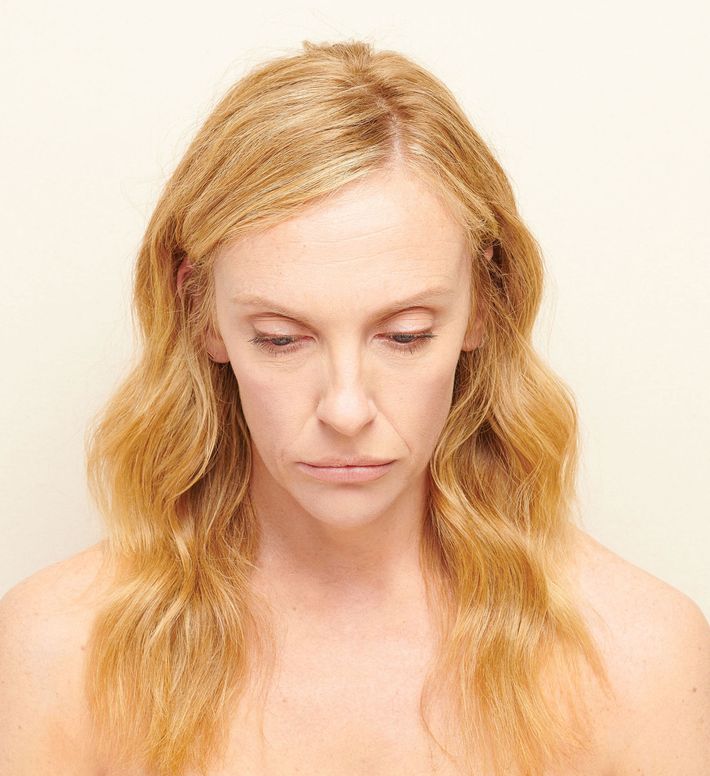
Another scene that really stuck out to me was the first time you see your mom’s spirit, your hallucination in the studio. This is the moment in the movie where, as a viewer, you’re like, “Okay, things aren’t really what they seem,” but we’re still trying to trust your character’s point of view. How do you tread that line?
I don’t think it’s uncommon for people when they lose someone to imagine that they’re still around. Even though my character doesn’t like her mother, there is something about family that’s inevitably going to draw you together and may have an impact on you, come what may, whether it’s good or bad. Or ugly.
I love that it’s ambiguous, too. Because [her mom] is there and she’s not there, and you don’t know whether it’s in my mind. You don’t know quite what’s going on. So it’s slightly unclear whether it’s almost hopeful when I’m seeing her, or whether I’m just making it up, or spooking myself. I love that by the end of the movie, you really don’t know whether my character is losing her mind or finding out something very real. I love that it feels like the ground is shifting. It’s really just great filmmaking to have the audience identify with these characters and their pain because then you’re investing in them emotionally. And when it does turn, it’s even more horrifying.
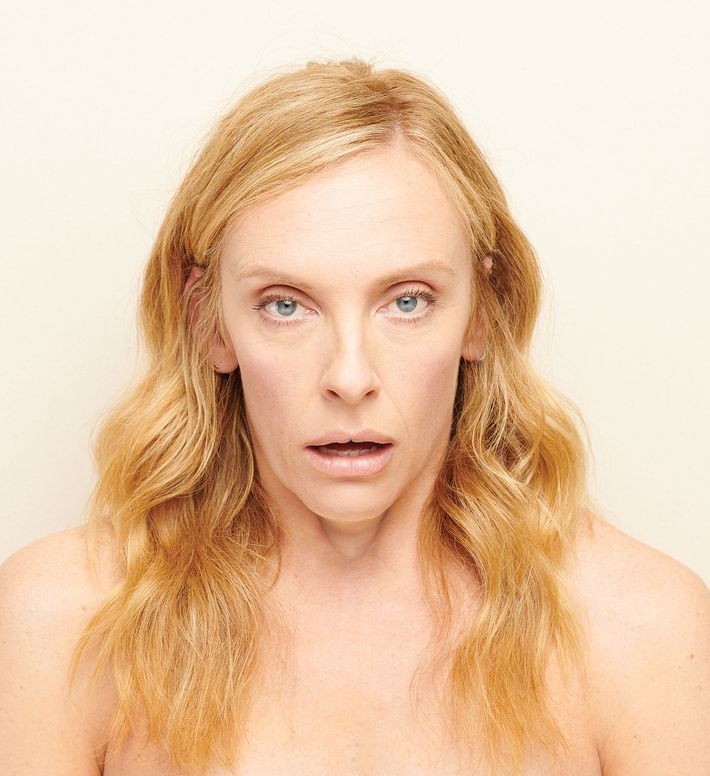
Have you ever seen a ghost?
Nope. I’d like to. I’d like something fucking solid. I want some proof of something. But I have a very good friend that I trust, very pragmatic, who would not lie about such things, and she’s been seeing ghosts since she was a teenager. She’s now in her 70s. There has to be more than this physical world that we’re experiencing. There just has to be. This is so temporary. I just I wish I had something more solid to go by. But I haven’t seen one, no.
If we ever meet in person, I’ll tell you my ghost story. I have a good one.
Ooh, I wanna know now!
It’s so long. It would take the rest of this interview.
Okay. Save it. But make sure you if see me, you have to come up and introduce yourself, because I don’t know what you look like.
Okay, I promise. I want to talk about Charlie’s funeral and Charlie’s death. I was so impressed with your performance — specifically, when you’re screaming as her casket’s getting lowered into the ground and when you’re at home and you’re keeled over, wishing for death. I’ve seen parents in that exact stage of grief, and you nailed it. I’m curious where your mind went while you were in those moments.
I never really draw on anything directly, because I think that’s unfair and a little obtuse. But it’s also inevitable for an actor to somehow use themselves indirectly, because that’s all you’re working with: your own experience, your own emotion. Not direct memories, but it’s you.
When we shot that scene, it was the end of the day, it was done pretty quickly, and after, I felt completely shattered. I went back to the hotel and did something I never do, ’cause I work out in the morning: I just went to the gym. I did so much going to the gym during this movie. I needed to move the energy around in my body and not let it be stagnant. Some of it did feel exhausting. I can’t even imagine — well, I can — the heartbreak you must feel to lose a child. Oh my god. It must be so hideous. More often than not, when I’m working with good writing, it’s more about empathizing, putting myself in that person’s position. We finished after that scene and I stumbled to the car, got back to the hotel and did a big run. I didn’t know what else to do, because it was just … it hurt a bit.
In these photos we took, you appear to have gone back to that place very easily, though. Are you able to just switch that on, or does it take a minute to get back into that headspace?
I felt uncomfortable doing it in the photo shoot because it’s out of context, right? But here’s the lucky thing for your magazine: I was menstruating [laughs]. It’s a little easier when you’re feeling that way.
I’ve been there!
Of course, when you’re in a film and it’s ongoing experience week after week, it becomes easier and easier to access things, because you’re steeped in it, you know what’s going on, and it’s just the reality you’re dealing with at the time, so it’s easy to tap in and tap out.
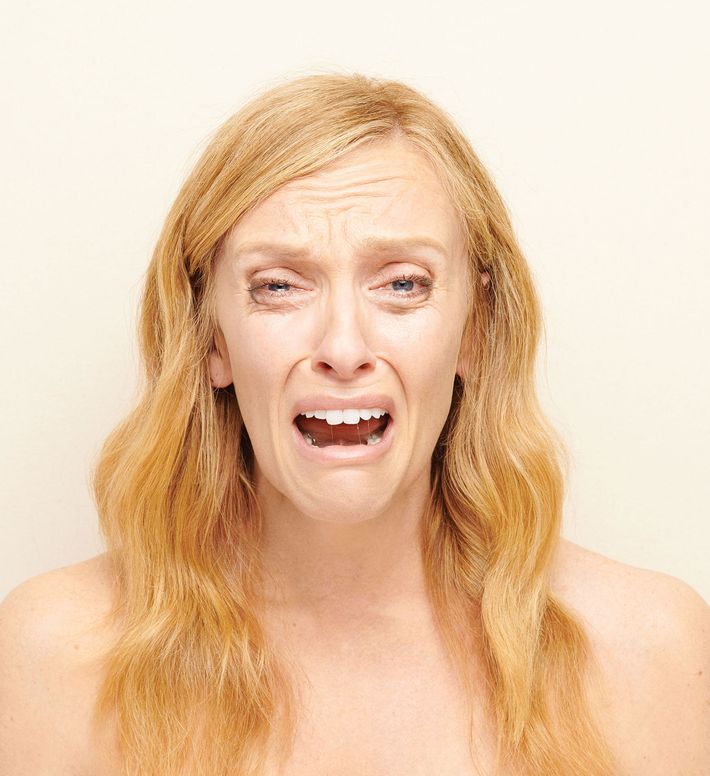
Let’s talk about the family dinner after Charlie’s funeral. Your son, Peter, is trying to get a rise out of you, and you become instantly furious. But there’s a lot of complexity there because of course you love him, but he’s also just killed your daughter, and you also admit later in the movie that you didn’t even want to have him in the first place. What was filming that scene like with Alex, going to such a dark place with this young actor?
Well, first of all, the scene where I said I didn’t want to have him is more of a dream sequence. When I read it, I had to talk to Ari a lot about that because it’s almost like she’s speaking her subconscious [feelings] through the dream. And it’s nothing that’s ever really uttered [in real life], but it allows the audience to know that this is a kind of murky, not entirely understood, gray area about the safety of her children and the intention behind the creation of them — and how her mother was involved, right? So it’s still not entirely clear, but there is an indication of some concern there.
[Filming the scene] was so funny. Everyone’s walking on eggshells around me that day [laughs]. Even Ari, as well as the crew. As if it was something that was gonna be more difficult than the rest of the film. But I was like, “Guys, it’s all so intense. I don’t know why you’re doing this!” Honestly, the scene just seemed so clear to me in the writing. I do allow the emotion to take over, but I allow it in a very nonspecific way, and let it run its course. By the end of it, I am shaking, and I do feel slightly overtaken by it. But it’s a controlled, out-of-control feeling.
That sounds bizarre. But I don’t know how to describe it. And Alex, he was fine, he knew what he was doing. We all knew what had to happen. Some of the scenes, I know I have to do them and I think “dread” is not the right word to use, but it was almost like I was avoiding them, because I knew that they were going to have to erupt and be their own thing. I didn’t stand there working myself up or anything. We get on set. They call action. And then you let it go. It comes out. I don’t know. I like that I don’t know!
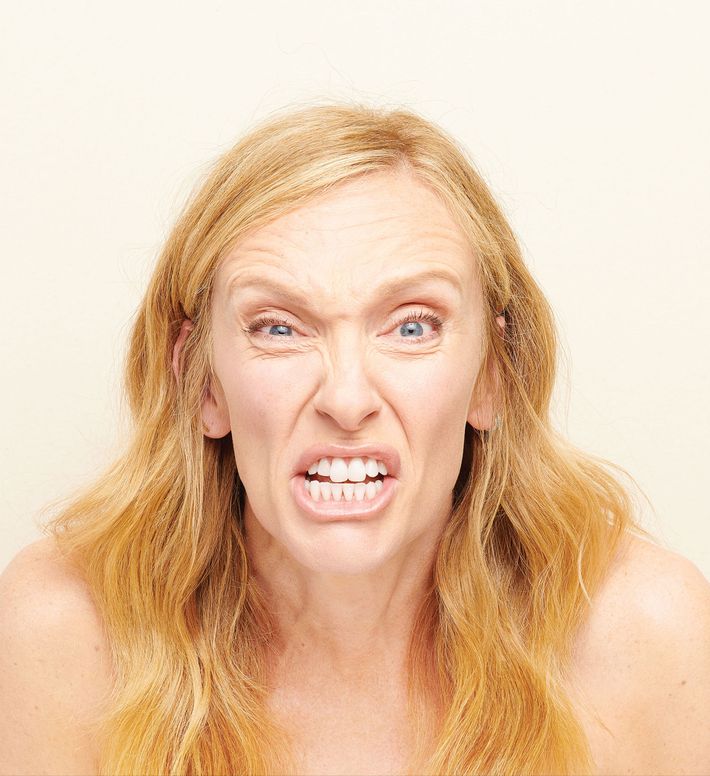
Something I noticed about you in this movie, but also in general: Your face is so, so expressive. When you’re acting, are you thinking, “Okay, right now I’m gonna turn my face this way, and grit my teeth like this, and raise my eyebrows,” or is it just something that happens naturally for you?
It’s just something that happens if I put myself in the position of feeling what’s meant to be felt in that moment. Everything else just flows from that. Unless there’s a really wide shot, and, say, someone needs to know that you’re confused. You’ll do something that every human would do, maybe scratch your head. There are some things where you need to show something physically because the audience isn’t close enough to read it. But generally, I try to put myself in the position of the character and feel things as holistically as I can. It’s an exhausting way to do it [laughs]. I’m not gonna recommend it to anybody, but that’s the only way I know how to do it.
Because I also know when I watch actors who are more technical, it is just so obvious to me, and then I’m lost — the story doesn’t matter anymore ’cause I don’t feel it. I have to be able to feel it to engage and to believe it.
There are these great points in the movie when you’re possessed by either Charlie or Paimon, the king of hell —
[Laughs loudly.]
And your face changes instantaneously, from animated to completely dead-eyed and slack-jawed. Was that something Ari told you to do? Or was that something you brought to the table?
You know how there’s a certain light that moves throughout the film? So as I’m standing there watching a man on fire … [Laughs]. Yes, these are experiences in life I know I will never have, so it’s very, very strange to have to act what I imagine to be how somebody would be in that moment. Anyway. I am horrified watching a man go up in flames. The love of my life going up in flames, when I’m the one who’s meant to have gone up in flames, so that’s complicated to begin with. And then, literally, that was my last shot in the movie.
Ari was standing to the side, and he let me watch this person be on fire for a while [laughs] and then he said, “Okay. Now, Paimon, the light, is going to enter you.” We never talked about what that would ever look like or be like. I just did one take and that was it. Because I was so horrified and emotionally stark and flipping out watching my husband on fire — I guess, without even thinking about it, I then did the complete opposite of that. Something that would indicate [Paimon’s] control is a completely neutral, kind of useless quality. That’s what I did in the moment. I didn’t even think about it, to be honest. I really didn’t. Ari and I never talked about how to do that, either, how to achieve it. It was my very, very last shot. We did it once, and that was it.
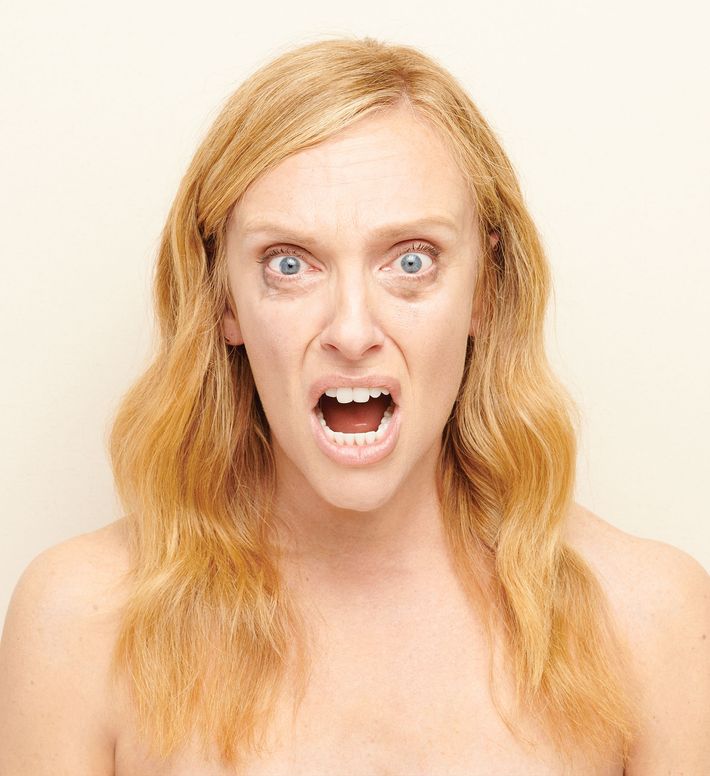
But then at the end when you’re fully possessed by Paimon — right before you cut your head off, you appear to be in that state for a while. That totally neutral, dead-eyed state. Was that a different sort of possession?
We actually shot that earlier, and it was just — I mean, I have never been possessed [laughs]. So it was more about taking the life out of it. There’s absolutely no animation whatsoever. Just dead-eyed. Dead. Dead! Dead-eyed.
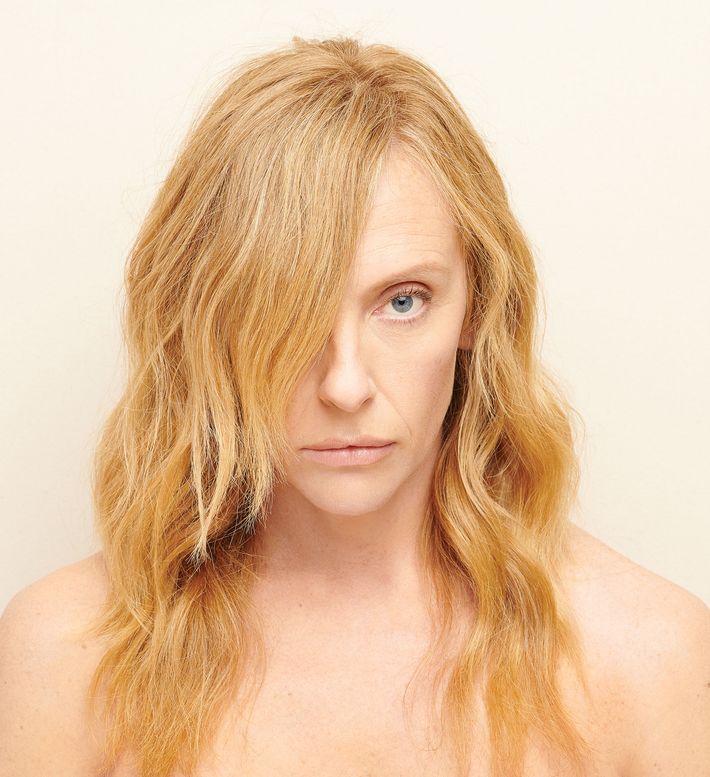
And then when you’re cutting your own head off — which is just a stunning, horrifying moment — you’re totally dead-eyed in that moment, too, which is so freaky and amazing. Walk me through the filming of that part.
So it took a while to get the prosthetic neck on, because I am actually using a piano string as written to cut my own head off. And there’s quite a bit of floating around, so I had to be put in the harness, and I was taken up quite high. There was a lot of blood that was hidden, and once I started cutting, Ari would say, “Now. Now. Now. Now. Now. Nownownownownownow.” And I would go faster and faster, sawing my head off. As that was happening, he was also yelling, “More blood! More blood! More blood!” [Laughs.]
It got to the point where they were kind of squeezing this blood to pop through and out of the neck piece at the same time. It felt so, so, so far away from everything else. It was very funny to do. Because it was, in a way, unemotional, right? I didn’t have to feel anything. I just had to do this weird thing. We knew it was hideous. It was so hideous that we couldn’t help but giggle a bit.
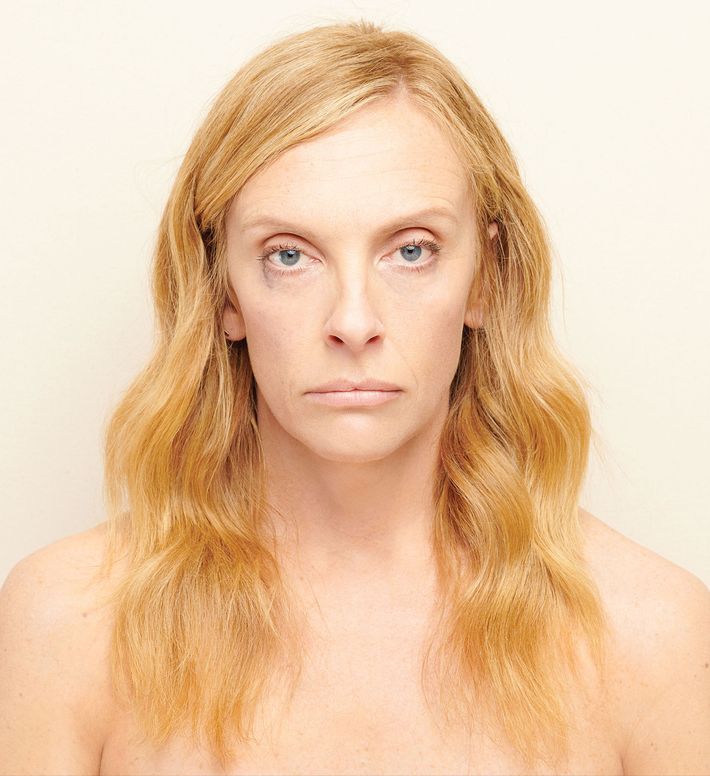
I would say the backstory of this movie is about 75 percent clear by the end, unless I missed something. How much of it was explained to you — do you know the entire mythology of it?
Yep! I do [laughs]. Even in reading it — I love ambiguity in a film. But everything was very, very clear. And if it wasn’t, then there was a lot of backstory that I could tap into that Ari had created. But it all does seem completely clear to me.
To me, the main thing that was left unexplained: Why did everyone have to lose their head?
Why everyone had to literally lose their head?
Yes.
I think you’d have to ask Ari about that. But don’t you think that’s like — we’re so attached to our bodies, we’re so attached to the brain and the mind. They’re like the control center, and that once you lose that metaphorically, you become nothing, and therefore you are able to give yourself over to this greater force?
I like that.
That’s what I’m thinking it is.
Okay, last question. Ultimately, this is a very dark film. It doesn’t end with any sort of hopefulness. What’s your prevailing feeling toward your character by the end? Was it one of sympathy, empathy? Did you understand her?
I have a huge sympathy for her because her entire life has been orchestrated by somebody else. She has unknowingly been manipulated her entire fucking life, and that is a huge betrayal. She has had no sense of freedom and no real sense of self or understanding, let alone basic nurturing and love from her family. This poor woman has not understood her existence. And when she does fucking find some understanding, it ain’t good [laughs]! It’s bad news. You do associate an awakening with positive change. There is no positivity, it is hopeless. It is entrapment. Her whole life has not been her own, and she is trapped in that, and there’s no way out.
Well, things end pretty well for Paimon.
Oh, god! You’re sick [laughs].
Hereditary is in theaters June 8.
*A version of this article appears in the May 28, 2018, issue of New York Magazine. Subscribe Now!


